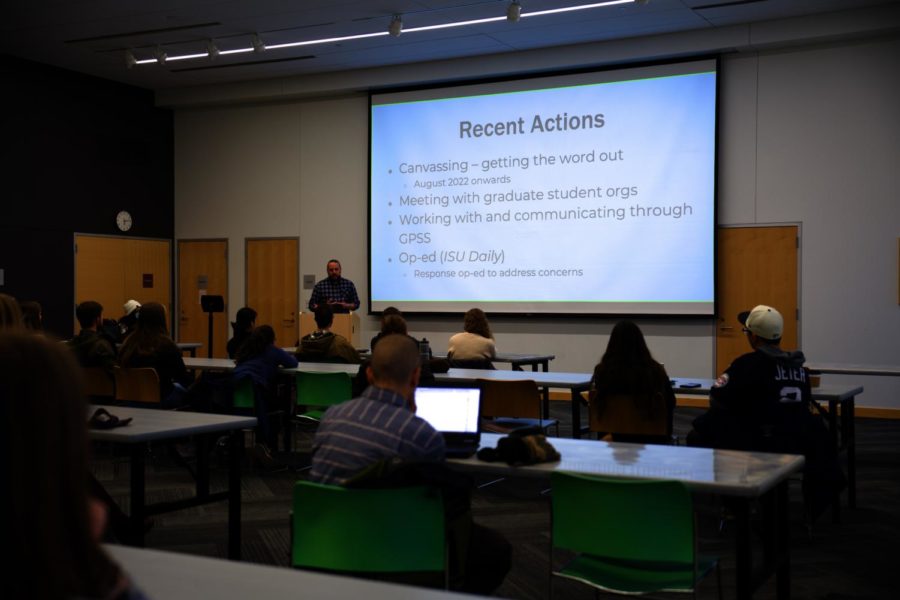Graduate Student Voices detail objectives and timeline for unionization
Individuals attending the Graduate Student Voices informational and question session at the Ames Public Library.
October 18, 2022
Members of the steering committee for Graduate Student Voices said they hope to establish the union as soon as the spring semester, but it all depends on gaining in numbers of support.
Graduate Student Voices garnered more than 110 supporting members in the organization’s efforts to formally unionize graduate students at Iowa State University.
The hurdles of unionizing
Obtaining this requirement is only one step of the organization’s to-do list before officially becoming a bargaining unit. Once the organization has 400 supporting members, there must be a vote by the members of Graduate Student Voices. The union campaign must receive a simple majority in support to be formally recognized by the Iowa Board of Regents.
“We definitely don’t want to hold a campaign to vote unless we think we can win,” said Chris Morris, a member of the steering committee. “… It is going to take some work from all of us, reaching out to our fellow graduate students to put the word out about the positives of unionizing.”
During an organizing and listening session Tuesday, the organization saw the largest turnout ever, with over 55 people in attendance virtually and in person. Graduate Student Voices steering committee members said they hope to obtain statistics on the discrepancies among stipend pay for graduate and professional students, but they need more supporters to do so.
Steering committee member Annabelle Lolinco, a graduate student in the chemistry department, said the threshold is recommended by the United Electrical, Radio and Machine Workers of America (UE). The UE would provide financial and legal support to the union once the threshold is met.
Goals of Graduate Student Voices
Some objectives of Graduate Student Voices include improving healthcare benefits, workers’ compensation, obtaining a base salary and scholarships for fees.
Within the session, graduate students shared their stipends which ranged from $18,000 a year to $26,000 a year. Other students in the audience shared their concerns about the ramifications when trying to receive workers’ compensation.
Not only has Graduate Student Voices sent a letter to the editor advocating for the unionization, but there was also a response opposing their efforts.
Morriss, a doctorate student studying sustainable agriculture and rural sociology, said the organization wants to open dialogue and work with the university as a partner.
“We are not against Iowa State University,” Morris told the Daily after the meeting. “I think Iowa State is an awesome organization; that being said, I think there are some problems that can be addressed, and we would hope that ISU would be a partner with us in this effort… so that we can reach an outcome that’s beneficial for all parties.”
Even though the National Labor Relations Act establishes employees’ right to form unions, Morris said he still expects to see forms of “union busting.”
In previous reporting from the Iowa State Daily, an Iowa State University communications specialist stated in an email response that the university “values all graduate students.” The emailed response also stated the university is partnered with a faculty-led Graduate Council as well as the Graduate and Professional Student Senate (GPSS) to “understand and respond to graduate student concerns.”
Morris said the statement served as another way of saying the issues brought by graduate students will be addressed by the university, making a union unnecessary.
“It’s part of the process,” Morris said. “It doesn’t mean that what we’re doing is wrong, or that it can’t work, because it absolutely can and has worked before … There’s nothing illegal about workers organizing together to work for their rights and better conditions.”

Another objective includes establishing graduate student workers as employees. According to past reporting from the Iowa State Daily, University Counsel “does not classify graduate research assistants as employees,” and the stipend workers receive is not considered compensation for the work performed.
“All of us that are working 40 to 60 hours a week on a 20-hour-a-week stipend know that we absolutely are employees,” Morris said. “We deserve to be compensated fairly for that work, at the very least, we deserve to be recognized as such.”
Iowa State alumna Audrey McCombs served as a mediator for the event. She said Graduate Student Voices is looking into the time tracking of work hours, which would allow graduate students to qualify for the Family Medical Leave Act. This federal legislation requires employers to provide employees with unpaid job-protected leave for family and medical reasons, ensuring the continuation of health insurance.
Graduate Student Voices also want an independent organization to examine grievances filed by graduate students to ensure results follow a complaint. Erika Ibarra-Garibay is a graduate student in the ecology, evolution and organismal biology department at Iowa State. Ibarra-Garibay said grievances include graduate students serving as teaching assistants in classes outside of their field of study.
Ibarra-Garibay also said if teaching assistants need time off, it is up to the discretion of the lab coordinator or teacher assigned to that class to permit the excused absences.
“There are a lot of issues, but they aren’t going anywhere,” Ibarra-Garibay said, “I think this is a great way to be more active…and find a good balance.”

















